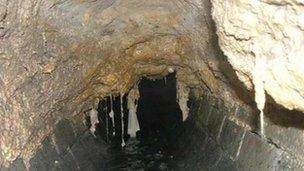Fat-eating bacteria put in Hull sewers to remove blockages
- Published

Yorkshire Water said it removed 2000 tonnes of fat blockages in its sewer network in 2011
Fat-eating bacteria are being put into Hull's sewers to try to get rid of fat blockages.
Yorkshire Water said it was targeting seven locations across the city where there were build-ups of fat deposits.
The firm is deploying organically grown bacillus bacteria, which is commonly found in the human gut, to eat the fat, oils and grease.
The blockages are caused by waste cooking oils from homes being poured down plug holes.
As the fat cools it hardens and deposits gradually build up.
According to Yorkshire Water, in the past six months maintenance crews have attended 1,700 jobs in Hull to remove blockages in local sewers, with 350 jobs carried out in February 2012 alone.
Last year, across its entire 33,500 mile (54,000km) sewer network the firm said it had removed 2,000 tonnes of grease.
Patrick Killgallon, pollution manager at Yorkshire Water, said: "We continue to encourage customers to think before they pour things like fat down their sink, we're also looking at new and innovative approaches to tackling this age old problem to support current practices such as jetting sewers with a high pressure hose.
"The deployment of fat-busting bugs in our sewer network is an example of this, with these 'good' bacteria literally feasting on solidified fat in our sewer.
"And because these bacteria constantly multiply in the right environment, we can leave them to get on with their job in our sewers, seven days a week, 24 hours a day, without the need for regular dosing."
- Published28 December 2011